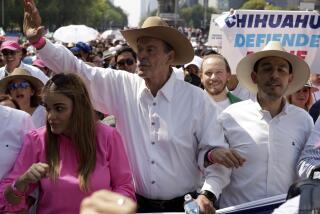Former Marxist guerrilla sworn in as president of Brazil
Accepting the green and yellow mantle of power from her immensely popular mentor, former Marxist guerrilla Dilma Rousseff was sworn in Saturday as Brazil’s first female president and faced two immediate tasks: keeping the booming economy on track and fleshing out Brazil’s developing role on the world stage.
Rousseff succeeded Luiz Inacio Lula da Silva, who left Planalto presidential palace in Brasilia with an 87% approval rating, the highest in recent history for a departing leader of South America’s largest and most populous country. She hopes to maintain the economic momentum that was the key to Lula’s power and popularity, while advancing an agenda of reducing poverty, improving education and tightening the state’s control of natural resources, particularly newfound oil riches.
Under tight security and heavy rainfall that precluded the traditional open car procession to the swearing in, the 63-year-old divorcee was accompanied by her only daughter, Paula, to the ceremony at the Congress in Brasilia. Secretary of State Hillary Rodham Clinton was among the leaders and representatives from 130 nations who attended the ceremony.
Rousseff won the presidency — her first elective office — in October on the strength of her close association with Lula, whom she served as chief of staff after 2005. In her inaugural address, Rousseff said her goal would be to “consolidate the transformational work” of Lula, adding that she would also strive to “open doors so that many other women also can, in the future, be president.”
“I don’t come here to extol my biography, but to glorify the life of each Brazilian woman,” Rousseff said. “My supreme commitment is to honor women, protect the weakest and govern for all.”
Paulo Sotero, of the Woodrow Wilson International Center for Scholars in Washington, said Rousseff will have to demonstrate that she can make the tricky transition from being a “competent technocrat” to a president able to create consensus among Brazil’s congressional members and the bureaucracy.
“Now she will have to show she can lead,” Sotero said. “The business of governing Brazil is first and foremost about managing a coalition of political parties that span the ideological spectrum, share a voracious appetite for government jobs and public resources, and see in every piece of legislation an opportunity to extract a concession from the executive.”
The daughter of a Bulgarian immigrant father, Rousseff studied economics in college. She was tortured in the 1970s for her membership in a leftist guerrilla group opposed to the military dictatorship that then ruled the country. Before joining the Lula government, she held state posts focusing on energy.
The Workers’ Party candidate takes control of an economy that is expected to grow 7.5% this year and to lead the region out of the global recession. She also takes the helm of a nation that gained enormous visibility and prestige under Lula’s presidency.
Relations with the United States are in flux, with the Obama administration pleased with Lula’s regional leadership as a counterweight to Venezuelan President Hugo Chavez but upset over his attempt last year to broker a deal ending Iran’s international isolation over its nuclear program. On Sunday, Chavez will be the first foreign leader with whom she meets.
Rousseff almost immediately will have to select a contractor from among U.S., French and Swedish bidders to supply $4 billion in jet fighters. She will have to push forward infrastructure projects, especially ports and airports, that have lagged behind the country’s economic boom.
She also must also steward the construction of billions of dollars worth of sporting venues and infrastructure as the nation prepares to host the World Cup soccer tournament in 2014 and the Olympic Games in 2016, and also keep a lid on drug-fueled crime flaring in host city Rio de Janeiro.
Rousseff has promised to reopen investigations of alleged human rights crimes committed by the military dictatorship that ruled Brazil from 1964 to 1985, a delicate theme with the nation’s armed forces.
Sotero of the Wilson center said Rousseff has filled about half of the 37-minister Cabinet with people who served under Lula. Among her key appointments was University of Chicago-trained economist Alexandre Tombini to succeed Henrique Meirelles as central bank governor. For chief of staff, she named Antonio Palocci, who was Lula’s first finance minister.
Soares and Kraul are special correspondents.
More to Read
Start your day right
Sign up for Essential California for news, features and recommendations from the L.A. Times and beyond in your inbox six days a week.
You may occasionally receive promotional content from the Los Angeles Times.






